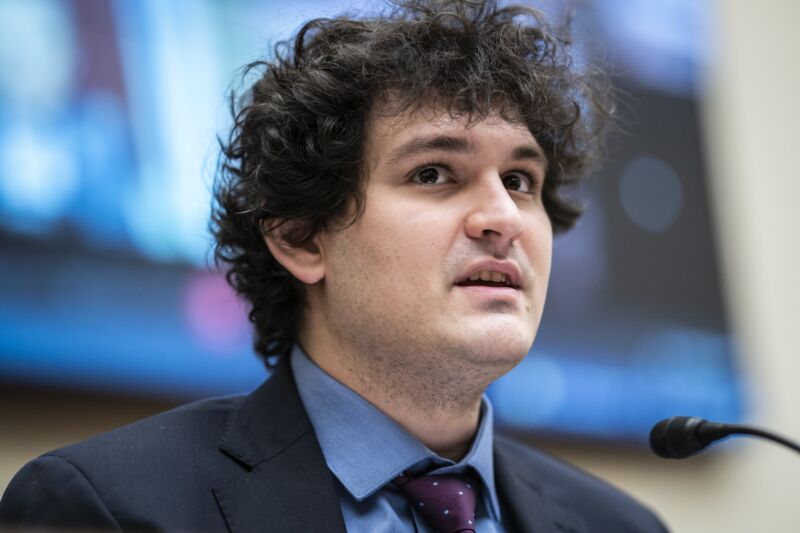
Getty Images | The Washington Post
FTX co-founder and former CEO Sam Bankman-Fried ran the failed cryptocurrency exchange because his “personal fiefdom” and many of its assets are gone, an FTX attorney said Tuesday at a hearing in U.S. Bankruptcy Court in Delaware . “A significant number of assets have either been stolen or have disappeared,” said James Bromley, a Sullivan & Cromwell partner representing FTX, according to a New York Times report.
“What we have here is a global, international organization, but it was run as a personal fief of Sam Bankman-Fried,” Bromley said, according to The Wall Street Journal. “FTX was under the control of inexperienced and unsophisticated individuals, and some or all of them were compromised individuals.”
Bromley also told the court that “considerable amounts of money” were spent on items unrelated to the company, including vacation homes in the Bahamas, the Financial Times wrote. FTX now owes its top 50 creditors more than $3.1 billion, according to a bankruptcy court.
FTX moved its headquarters from Hong Kong to the Bahamas in September 2021, attributing the move to the Bahamas’ favorable cryptocurrency regulations. A Fortune report said that “FTX broke ground on a $60 million headquarters in the Bahamas in April,” but “local construction companies and people familiar with the matter” confirmed that construction never started.
“We have witnessed one of the most abrupt and difficult collapses in the history of corporate America,” Bromley said at the hearing, adding that the bankruptcy proceedings “allowed, for the first time, everyone to look under the covers and to recognizing that the emperor had no clothes.”
Bankman-Fried to staff: “I disappointed you all”
Bankman-Fried apologized to FTX employees in a newly reported letter shared in the company Slack. “I didn’t mean for any of this to happen, and I would give anything to be able to go back and do things again. You were my family,” he wrote in the letter, published by Quartz. “I lost that, and our old house is an empty warehouse with monitors. When I turn around, there’s no one left to talk to.
Bankman-Fried also wrote to former employees that FTX filed for bankruptcy because of “an extreme amount of coordinated pressure,” which he said he “reluctantly” agreed to.
“I froze with pressure and leaks and the Binance LOI [letter of intent] and said nothing,” Bankman-Fried wrote, referring to Binance’s abandoned plan to buy FTX. Bankman-Fried resigned as CEO when FTX filed for Chapter 11 bankruptcy in Delaware court on Nov. 11.
As noted by CoinDesk, Bankman-Fried’s letter did not address allegations that FTX diverted client and corporate funds to support Bankman-Fried’s Alameda Research, revelations that Alameda had an exemption from FTX’s normal liquidation process or statements that Alameda had funds loaned to FTX officials, including himself.” Alameda Research is a related company co-founded by Bankman-Fried that also filed for bankruptcy on Nov. 11.
As previously reported, FTX’s bankruptcy filing “came after a whirlwind 10 days in which Bankman-Fried desperately sought billions of dollars to save his company after customers rushed to remove their assets from the company over concerns about its financial health and ties between the fair and Alameda.”
FTX was valued at $32 billion
FTX’s valuation rose to $32 billion in a $400 million funding round announced in January 2022. In September, FTX was reportedly in talks with investors to raise up to $1 billion in another round of funding that would have maintained the company’s $32 billion valuation.
At yesterday’s hearing, Bromley said the bankruptcy team had found “substantial funds” had been transferred from the exchange to Bankman-Fried’s crypto hedge fund Alameda Research, and “substantial amounts of money were being spent on things unrelated to the company.” .” wrote the Financial Times. That included about $300 million in Bahamas real estate, consisting of “homes and vacation properties used by the senior executives” of FTX, he said.
FTX’s new CEO, John Ray III, told the bankruptcy court last week that he had never in his career seen “such a complete failure of corporate controls and such a complete absence of reliable financial information as here.” FTX did not have an “accurate list of bank accounts and account signatories,” lacked a full list of employees, and used “an unsecured group email account as the root user to access confidential private keys and critically sensitive data for the FTX Group companies nearby the world,” he also wrote in the lawsuit.
Separately, Semafor reported yesterday that Bankman-Fried invested $100 million in Elon Musk-owned Twitter. Musk denied the report.

